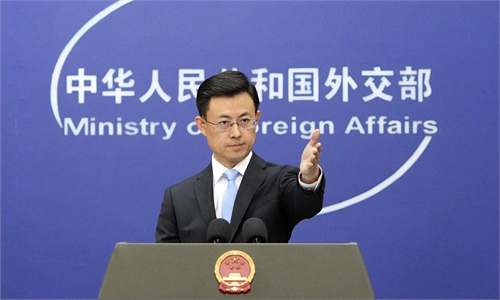
Customers check out at an ACE hardware store in San Francisco, California, US. Photo: VCG
By abandoning multilateral trade rules and wielding the unilateral tariff stick, the US seeks to achieve policy objectives like reducing trade deficits. However, this strategy, rooted in misguided assumptions, is likely to backfire. If the US continues down this path, it will have significant repercussions for the global trade system, ultimately undermining its own standing.The US is unlikely to achieve its goals of reducing the trade deficit through high tariffs. For instance, after imposing high tariffs on Chinese goods, the US saw a significant decline in its agricultural exports to China. In response to US tariffs on certain products, China also imposed tariffs on US agricultural and industrial goods, resulting in a decreased market share for US agricultural products in China and a substantial drop in export volumes, further exacerbating the US trade deficit.
In trade with countries outside of China, the US also relies heavily on various forms of trade. High tariffs will inevitably undermine trade cooperation with these nations, which will, in turn, negatively impact the US itself. The US government has failed to adequately consider the countermeasures that other countries may take in response to high tariffs. In the current global geopolitical and economic cooperation landscape, any country facing the US' unreasonable so-called "reciprocal tariffs" will inevitably take measures to defend its sovereignty and interests, significantly diminishing the expected effectiveness of US tariff policies.
If the US genuinely wishes to reduce the trade deficit, the necessary measures are not protectionist but rather involve expanding market openness. Objectively, the fundamental principle of international trade is to leverage one's own advantages and export them, such as the US' high-tech and financial services. If the US eases export controls and restrictions on high-tech industries rather than impose high tariffs, its trade balance with China would be improved.
Moreover, persisting with misguided high-tariff policies may lead to even more negative consequences for US economic and trades. The tariff hikes will inevitably result in a lose-lose scenario, severely damaging the US' foreign trade prospects.
Currently, US manufacturing relies heavily on imports of intermediate goods such as electronic components. Tariffs will disrupt supply chains, raise production costs, and exacerbate bottlenecks, ultimately undermining the global competitiveness of US companies like Apple and Tesla.
The staggering 145 percent tariff rate on China is already having a significant impact on the import prices of the US. Additionally, the US government's current suspension of so-called reciprocal tariffs on other countries still contains considerable uncertainty. If the US fails to secure agreements and continues to impose widespread "reciprocal tariffs," it would severely impact domestic inflation and disrupt the US economy.
The uncertainty surrounding high tariff policies will also trigger volatility in financial markets and increase investors' risk perceptions. Although the US has suspended so-called "reciprocal tariffs" on most countries, the uncertainty surrounding negotiations is expected to persist for a long time, which is precisely what investors are most wary of. As a result, investors may become concerned about the US economic outlook, leading to a reduction in investments in the US assets.
High tariff policies may accelerate the decline of the dollar's hegemonic status. The unreasonable additional tariffs imposed by the US on China will reduce US imports from China. Additionally, the tariffs will also weaken the dollar's dominant position in trade settlements, prompting China to accelerate the internationalization of the yuan.
The US' position in global trade will also be impacted. The US' high tariff policies not only target China but also affect traditional allies such as the EU and Canada. This approach may cause these countries to reduce their economic dependence on the US and accelerate trade diversion.
The author is senior fellow at the Center for International Security and Strategy, Tsinghua University. bizopinion@globaltimes.com.cn
The uncertainty surrounding high tariff policies will also trigger volatility in financial markets and increase investors' risk perceptions. Although the US has suspended so-called "reciprocal tariffs" on most countries, the uncertainty surrounding negotiations is expected to persist for a long time, which is precisely what investors are most wary of. As a result, investors may become concerned about the US economic outlook, leading to a reduction in investments in the US assets.
High tariff policies may accelerate the decline of the dollar's hegemonic status. The unreasonable additional tariffs imposed by the US on China will reduce US imports from China. Additionally, the tariffs will also weaken the dollar's dominant position in trade settlements, prompting China to accelerate the internationalization of the yuan.
The US' position in global trade will also be impacted. The US' high tariff policies not only target China but also affect traditional allies such as the EU and Canada. This approach may cause these countries to reduce their economic dependence on the US and accelerate trade diversion.
The author is senior fellow at the Center for International Security and Strategy, Tsinghua University. bizopinion@globaltimes.com.cn



